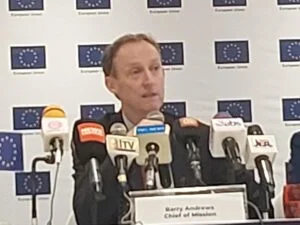The European Union Election Follow-up Mission (EFM) has called on Nigerian authorities to advance timely electoral reforms.
The EU EFM’s Chief of Mission, Mr Barry Andrews, made the call during a press conference on Friday in Abuja.
Andrews said that the advancement of the reforms would help restore public confidence and facilitate credible, inclusive elections in 2027.
According to him, the country’s democratic resilience depends on reforms that citizens can believe in.
He lauded the legislative momentum seen in the Electoral Act (Amendment) Bill 2025 and the ongoing constitutional review process but stressed that time was running out.
“We welcome the legislative momentum seen in the Electoral Act (Amendment) Bill 2025 and the ongoing constitutional review process, however, time is rapidly running out.
“Unless these reforms are concluded within the next few months, there is a risk of repeating the serious shortcomings of 2023.
“We encourage all
political actors to seize
the inclusiveness and credibility of the 2027 elections momentum to deliver reforms that can safeguard transparency.
“The EU EFM in 2023 provided 23 recommendations including strengthening the Independent National Electoral Commission (INEC), ensuring a transparent results transmission system and safeguarding freedom of
expression.
“The recommendations also include addressing impunity for electoral offences, eliminating legal ambiguities and promoting meaningful representation of women,” Andrews said.
According to him, the mission is politically neutral, non-partisan and independent in its findings and recommendations and also respects the sovereignty of the host country.
He said that the EFM had met with stakeholders,
including the INEC, National Assembly members, political parties, civil society, media
institutions and practitioners, and development partners.
“We are encouraged by the constructive cooperation between civil society organisations and
members of the legislature, particularly in shaping proposals for a stronger legal framework.
“This inclusive engagement is an important sign of commitment to reforms that can strengthen credibility and foster greater public confidence in the electoral process.
“The EFM found that while two recommendations have been partially implemented, one fully implemented, eight are ongoing, three are too early to determine, and nine have not been implemented,” he said.
The Chief of Mission noted that public confidence in INEC had remained low, despite efforts made and progress achieved.
He stressed that restoring confidence in the electoral process would require a merit-based and non-partisan appointment process of its new chairperson.
According to the EU official, a non-partisan chairperson appointment will send a powerful signal of commitment to credible elections.
He advocated for a robust system for real-time publication of polling units and collation results, allowing citizens to verify both
paper and electronic records


